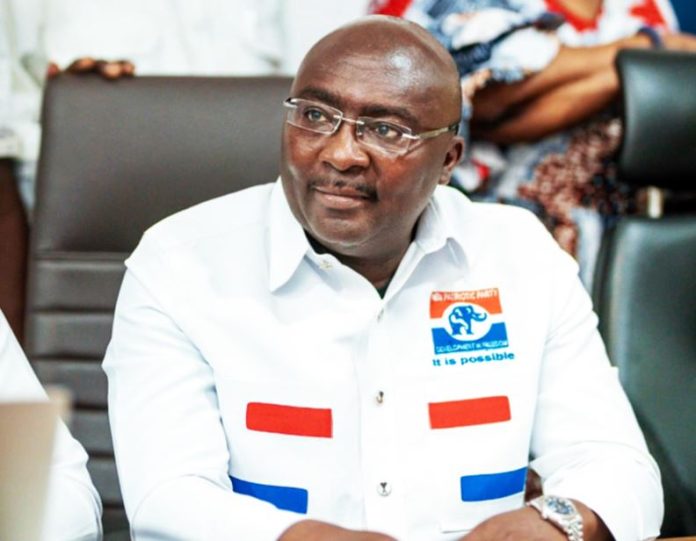The flag bearer of the ruling New Patriotic Party (NPP), Dr. Mahamudu Bawumia, is the preferred presidential candidate, ahead of the December 2024 elections, the latest survey has revealed.
According to the poll, carried out in April 2024, Dr. Bawumia leads with 38.9% popularity, ahead of John Mahama, who came in second with 36.1% support from participants.
In the poll, conducted by Prof. Smart Sarpong, Director of Research and Innovation at Kumasi Technical University, 21.4% of the participants remain undecided, making them the crucial determining factor. Smaller parties, collectively, hold a marginal 3.6% of voter support.
This is a baseline survey, highlighting the popularity of the various presidential candidates six months before the presidential elections, the media was told on Wednesday, June 5, 2024.
The survey revealed that six regions, for instance, are exceptionally rooting for the Vice President, Dr. Bawumia.
In the North East and Ashanti regions, over 1,300 and 6,000 participants respectively expressed tremendous support for the candidature of Dr. Bawumia.
Dr. Bawumia also leads Mahama in the Ahafo, Bono, Central, Eastern, Western and Western North regions. But Mahama is popular in the Volta Region.
The survey revealed that, while the National Democratic Congress (NDC) party is more popular than its presidential candidate, John Mahama, Dr. Bawumia, the presidential candidate for the NPP, is more popular than his political party.
PRIORITY
According to the survey, participants prioritised competence, track record and party affiliation in deciding which candidates they preferred.
They also identified unemployment, inflation, poor roads, water and power crises, and illegal mining as critical challenges that would influence their decisions.
The lead researcher, Prof. Smart Sarpong, indicated that the priorities of the participants demonstrate that electorates anticipate campaigns centered around these relevant issues.
AREAS
The survey was conducted to provide a baseline assessment for the upcoming 2024 general election.
It gathered data on voter preferences, candidate popularity, regional dynamics, critical issues and key deciding factors influencing voter decisions.
Also, voters are looking at issues of water, power, roads and poor infrastructure as significant concerns. Other critical issues include illegal mining, LGBTQ rights, corruption and poor sanitation.
DATA COLLECTION
The Researcher used 30 days to collect data for this baseline study, commencing April 1 to 30, 2024.
He said that many interesting inquiries were sorted from respondents and will be published in subsequent publications on his social media handles, especially constituency-specific / parliamentary-level reports.
In the press engagement yesterday, he shared with the regional and national-level findings in respect of parties and their presidential candidates, as well as the people’s manifesto, where the critical needs of the people will be discussed.
SAMPLE SIZE
In all, the survey had 59,547 eligible voters from the 275 constituencies as the full sub-sample.
Each sub-sample represented a proportional share of the total contribution to the voter population in the 2020 voter register.
OBJECTIVE
The polls aimed to provide valuable insights for political stakeholders, guide strategic campaigning efforts, and contribute to a more informed and data-driven political discourse in Ghana.
The survey was to give voters the opportunity to express their views to an independent researcher and learn from the views of other voters to digest when making their decision.
Prof. Smart Sarpong said the findings of election research are favourable; they can boost the energy of political actors and encourage campaign teams to continue their efforts.
He added that candidates and other key players will always need independent research to guide their operations.








